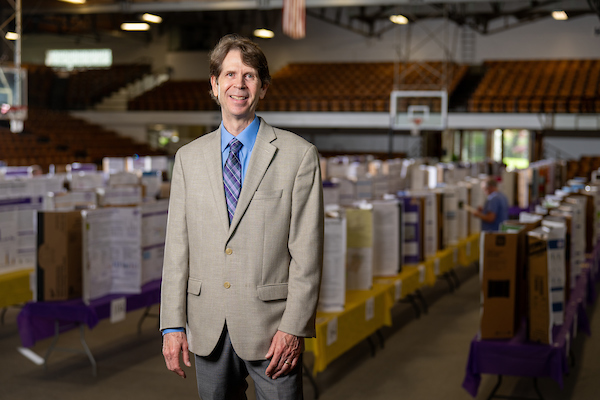How to Turn Your Research into a Real-World Impact
Research projects are more than just a requirement for a graduate degree. Research opportunities provide students the opportunity to start positively impacting people and the world around them during their educational journey.
Hayden Mattingly, director and professor in the School of Environmental Studies, has personal and professional advice on how to do so.
 “One of my primary motivations is to provide students with hands-on experience working
with research questions that have a positive impact on the health and well-being of
humans and the natural world, including the vital services provided by healthy ecosystems
such as clean drinking water, pollution reduction, and maintenance of biodiversity,”
Mattingly explained.
“One of my primary motivations is to provide students with hands-on experience working
with research questions that have a positive impact on the health and well-being of
humans and the natural world, including the vital services provided by healthy ecosystems
such as clean drinking water, pollution reduction, and maintenance of biodiversity,”
Mattingly explained.
Taking advantage of research assignments in graduate courses is very important. Students gain experience while also gaining insight on the career path they want to pursue.
“With this type of experience, students can more readily become effective employees and have a strong impact wherever they live and work after graduation,” he stated.
Mattingly is also a freshwater ecologist. In one of his laboratory-based research projects, he studied why the Barrens Topminnow fish species has been declining, which was found to be happening due to the invasive Western Mosquitofish. He has learned firsthand the importance of research and how it can elicit change and positive motion in the environment.
“Our findings led to a shift in management and recovery actions of Tennessee Wildlife Resources Agency, U.S. Fish and Wildlife Service, Tennessee Aquarium and other partners to focus more on various strategies to reduce the harm caused by Mosquitofish,” Mattingly pointed out.
As helpful and impactful as research can be, Mattingly acknowledges that the graduate students in the environmental degree programs are scientists not policymakers. Although it can feel like both at times, it is important for students to recognize their difference of roles.
“As scientists, we are providing neutral, unbiased findings that policymakers in turn can use to inform their decisions,” he continued. “Therefore, I encourage students to think carefully about the research objectives and the experimental design in order to provide the most information with the least amount of cost to the sponsor.”
Research is an intense and detailed task. Therefore, Mattingly clearly provides us with what he considers to be the most important skills for graduate students to have in order to grow the reach of their research.
“Key skills for graduate students would be effective written and oral communication skills and experience,” he acknowledged. “Maximizing research impact involves asking the right research questions, following through with the research, presenting and publishing the research, and communicating with a variety of audiences, including lay audiences, about the finding and why the research is relevant and meaningful to society.”
Mattingly emphasizes that the key step to connect research to real-world impacts is the very first step and if this step is overlooked, the impact of research may be limited.
“My advice would be to first think carefully about the research questions and the experimental design in the context of the funding agency and its goals and mission,” he encouraged. “Imagine different outcomes of the research before it begins and then rework the design if necessary.”
Research is not just for a project or the environment, it is for the entire community. A great way for students to expand their research is by including the public in the process.
“I have found that community events that involve music and food, such as Earth Day, or school events that connect students with the natural world to be the most effective ways of engaging the public,” Mattingly suggested.
For more information regarding research at Tennessee Tech, visit www.tntech.edu/research/

